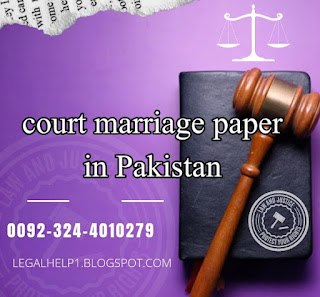court marriage paper in Pakistan
 |
| court marriage paper in Pakistan |
Title: Navigating the Court Marriage Process in Pakistan
Introduction:
Court marriages in Pakistan provide a legal framework for couples to solemnize their union outside the traditional religious ceremonies. This alternative allows individuals to bypass some of the cultural and religious complexities associated with marriage. In this article, we will delve into the essential aspects of court marriage papers in Pakistan.
1. **Legal Requirements:**
- Both parties must be of legal age, typically 18 years or above. Consult with us if the couple is under age. In Punjab the bride age of Marriage is required 16 years.
- The individuals should be of sound mind and capable of understanding the implications of marriage.
- Consent of both parties is crucial, and it must be given willingly without any coercion.
2. **Documentation:**
- National Identity Cards (NICs) of both individuals are mandatory.
- Four passport-sized photographs of each party.
- In the case of previously married individuals, divorce or death certificates of the former spouse are necessary.
3. ** Consultation Process:**
- Visit the our office to obtain the marriage form.
- Fill out the form accurately, providing all required information.
-we will Attach the necessary documents and submit the completed form and other legal requirements.
4. **Court Process after marriage :**
- The Magistrate court or session court reviews the submitted documents and verifies the information provided.
- After verification, the statement of bride will be recorded before court and court will protection order .
5. **Court verified order :**
- after completion of court process you can get court verified order which are conclusive prove of court marriage .
6. **Issuance of Marriage Certificate:**
- Upon successful completion of the process, the Union Council issues a marriage certificate.
- The certificate serves as legal proof of the marriage and is crucial for various administrative purposes.
7. **Solemnization of Marriage:**
- The court marriage can be solemnized at the court premises or any other specified location.
- A Nikah Khawan or a marriage registrar conducts the ceremony, and the marriage certificate is signed by both parties, the Nikah Khawan, and witnesses.
8. **Registration of Marriage:**
- It is essential to register the marriage with the concerned authorities of Union Council. for official recognition.
- The marriage registration provides legal standing to the union and facilitates matters like inheritance and spousal rights.
9. **Post-Marriage Procedures:**
- Obtain multiple copies of the marriage certificate for various administrative purposes.
- Notify relevant authorities about the marital status change, such as updating records with the National Database and Registration Authority (NADRA).
Conclusion:
Court marriages in Pakistan offer a legal and straightforward alternative for couples seeking a union. Navigating the process involves adhering to legal requirements, submitting the necessary documentation, and following the procedural steps outlined by Muslim family ordinance . By understanding the intricacies of court marriage papers, couples can embark on a lawful and recognized marital journey in Pakistan.



Comments
Post a Comment